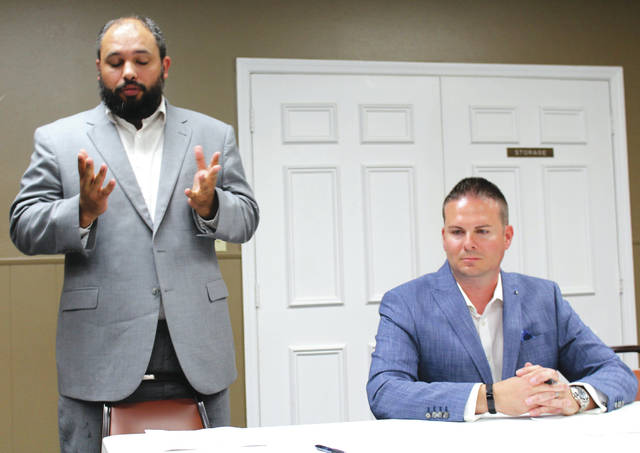
BATH TOWNSHIP — The Greene County Prosecutor’s Office is issuing a cease and desist order requiring Renergy Inc., an Ohio-based bioenergy company, to bring its Dovetail Energy LLC anaerobic digestion facility into compliance with the Bath Township zoning code or face legal action.
Special Prosecutor Jess C. Weade conveyed the decision of the Bath Township Board of Trustees to the public following an executive session held on Sept. 4. Renergy Inc. currently operates the biodigester facility on a 14.7-acre parcel on Trustee Tom Pitstick’s farm at 1156 Herr Road. Weade, an attorney and prosecutor from Fayette County, has been working in conjunction with Greene County Prosecutor Stephen K. Haller concerning the zoning issue.
Weade explained that the trustees’ decision was based on a thorough report that Jacob Barnes, an independent zoning inspector, presented to the board during the township meeting, held prior to the executive session. Township Trustee John Martin also noted that Pitstick recused himself from the decision-making process.
“Based upon Jacob’s report, we believe that we do have a property that is in violation of the Bath Township zoning code,” Weade said. “The first state of recourse that the county prosecutor’s office will take in this situation is to issue a cease and desist or notice-of -violation letter.”
Weade told township trustees that the cease and desist letters would be sent to Renergy Inc. and Pitstick no later than Monday, Sept. 9. Once those letters are sent, there is a 30-day compliance period, according to Weade.
“If things are not in compliance by then, we will be taking the next step, which could include some type of resolution with the company and leaseholder, litigations or presenting the zoning violations in municipal court,” said Weade.
During a special session held on June 28, township trustees appointed Barnes, a planning director for Springfield Township in Lucas County, Ohio, to investigate the allegations of a zoning violation involving Dovetail Energy LLC. In a 12-page letter dated March 30 and addressed to Township Trustees Steve Ross and John Martin, as well as Richard C. Sahli, a Columbus attorney representing township residents Ron, and Kassie Lester and Benjamin (Matt) Jones, claimed that the township has allowed an industrial operation in an agricultural zone.
Barnes noted in his report to township trustees, that his opinion was not a legal opinion but strictly a zoning opinion. He went on to state that the initial zoning permit, issued to Pitstick on July 1, 2013, allowed for the construction of an anaerobic digestion facility under am agricultural exemption.
“This permit appears to have been issued correctly based on the information the township had at the time,” Barnes said. “That parcel and the surrounding parcels were zoned for agricultural activities, and there was a CAUV (Current Agricultural Use Value) exemption in place for the property.”
However, Barnes pointed out that since the permit was issued and the biodigester facility was built, the township trustees have received numerous complaints about heavy truck traffic and foul odors emitting from the facility. Residents also filed a complaint with the Greene County Auditor’s Office claiming that the property, which houses Dovetail Energy LLC, was not entitled to a CAUV exemption because the facility is an industrial operation.
“The complainants believed that the new use of the property did not make it eligible for an agricultural tax exemption. In June 2018, the Greene County Board of Revision voted to remove the CAUV tax status from the property,” said Barnes. “From a tax perspective, it was determined that the land use is no longer agricultural.”
Barnes, whose qualifications include nearly 20 years of experience in planning and zoning, said he had carefully reviewed the entire file on the property in question and had visited and toured the site. Barnes noted that he appreciated both perspectives of the zoning issue as well. However, he referred to Section 519.21 (A) and (C) (2) of the Ohio Revised Code (ORC), as well as ORC Section 5713.30 (A) (b) to render an unbiased decision.
“The use of this property at the present time appears to be more industrial in nature as opposed to agricultural. This is in violation of both the Ohio Revised Code and the Bath Township zoning resolution,” Barnes said. “Based on a review of the official Bath Township zoning map, this area is a residentially/agriculturally-zoned area, and it appears that industrial zoning would be ‘spot’ zoning. This may be difficult to acquire at this location.”
The next regular session of the Bath Township Boards of Trustees has been moved to 7 p.m. Monday, Sept. 16. Township meetings are held at the township office, located at 1006 Yellow Springs-Fairfield Road in Fairborn. Township meetings are open to the public.


